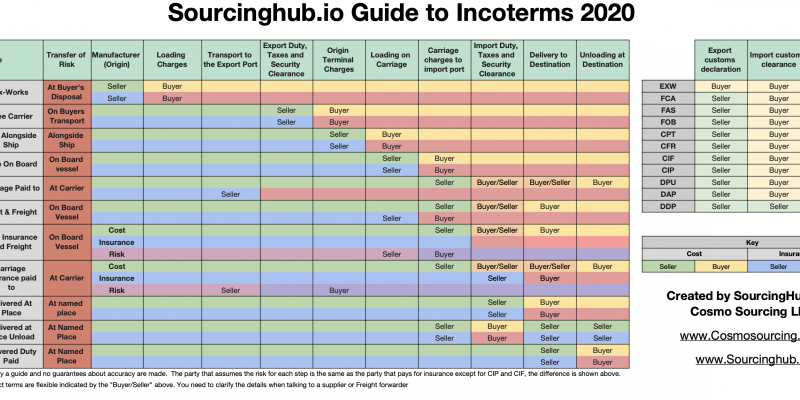This guide is part of our series on Shipping, Check out Sourcing Hub’s Ultimate guide to Freight Shipping for more articles on Shipping
On January 1, 2020, the new Incoterms 2020 went into effect. These new terms were released by the International Chamber of Commerce in Sept of 2019 and set guidelines for how shipments between a seller and buyers in different countries are handled. The ICC has released new incoterms every decade with the last change in 2010. Incoterms also define who is expected to pay the insurance and when the transfer of risk happens between the buyer and the seller. This is the first time that the Incoterms 2020drafting group has included representatives from China.
One big thing to keep in mind is the Incoterms 2020 is Voluntary and needs to be in addition to the contract. As Incoterms are defined and recognized globally it’s important that you reference them when making a contract. Regardless, you can choose not to use the incoterms when creating a shipping contract as long as you make sure to define which parties are responsible for the delivery of goods, insurance, shipment, risk, customs clearance and more.
Click Here to Access the full Incoterms 2020 infographic
What differs from the Incoterms 2010 to Incoterms 2020?
Overall, the difference between the 2010 and incoterms 2020 is fairly small when compared to the changes from the previous decades. There is only one new term and most of the changes are minor. We wrote an abbreviated guide to Incoterms 2020 vs 2010
DAT is now DPU
DPU (Delivery Place Unloaded) replace DAT (delivery at Terminal), in the incoterms 2020. This is the only newly named term in the guide, and the term is erectly exactly the same, just with clearer language and rules. The obligations of the Buyer and Seller are exactly the same in both DP and DAT.
The ICC viewed the change as necessary as you cannot unload goods at the dock, port or airport, so they needed to make it clear that it could only be unloaded after the goods had been cleared by customs and had arrived at a final destination such as a warehouse.
FCA option for On-Board notation for Bill of Lading
In the Incoterms 2010 rules who was responsible for the On Board Bill of Lading was not defined and had to clarify in the contract if the FCA option was chosen. As this leads to confusion, the new 2020 rules make it clear the buyer should instruct the carrier, or it’s agent, to release the Bill of Lading(B/L) on the seller’s behalf. The B/L will have the annotation of on-board or Aboard that states, the goods have been loaded on the vessel. The Bill of Lading is one of the most common documents and is used to release payment if you are paying by a letter of credit.
New Insurance Rules For CIF and CIP
There are some changes to Cost Insurance and Freight (CIF) and Carriage and Insurance Paid To (CIP) which are the only two Incoterms that define who is to pay for insurance. For both CIF and CIP the insurance is to be paid by the seller. Presouvly the seller was only responsible for the minimum insurance requirements, however, in the new rules, the seller has to purchase insurance for the shipment to at least 110% of the value of the goods.
Greater clarity on who is responsible for what
The new 2020 clarified which party is, the buyer or seller, is responsible for Customs Clearance, which party is responsible for the payments and who is to assume the risk and insurance cost. The new rules were rewritten to use less technical jargon and to be easier to understand. It tried to make the rules as clear as possible while still being legally enforceable in a multinational legal contract.
DIY Transport Options
For the first time, the new incoterms 2020 now recognize that both the Buyer and seller can transport the goods themselves using their own vehicles. In the previous version, the rules assumed that the transportation would exclusively be handled by a 3rd party shipping service. Basically this means that they recognize that the buyer can now pick up god using their personal vehicle from a port or terminal destination.
This update only effects Free Carrier (FCA), Delivered at Place (DAP), Delivered at Place Unloaded (DPU) and Delivered Duty Paid (DDP)
New Security Requirements
The new rules make it much more clear which party is to be liable at two key points: Transport from the country of origin and customs clearance into the destination country.
For the transport out of the country, the Seller is to assume liability for CPT, CFR, CIP, CIF, DAP, DPU, and DDP while the Buyer is liable if it is EXW, FCA, FAS, and FOB. Customs clearance falls on the party defined in the terms.
What are Incoterms and trade terms?
What are the Trade Terms on Alibaba? Are you confused about what the 3 letters that came with your quote mean? Cosmo Defines the incoterms 2020 abbreviations, such as FOB, CFR, and DAP for international trade!
When you’re getting quotes from suppliers they will almost always give you three pieces of information: the price per unit, the MOQ (Minimum Order Quantity) and the shipping terms. The shipping terms, commonly called incoterms, are usually given as just 3 letters at the end.
For instance, this is a quote I recently received “Thank you, Jim, please see below 1000-1.75/pc, 2000-1.65/pc, 10000-1.50/pc, EXW”. In this case, the EXW stands for Ex-Works and defines what the shipping terms are and what obligation you, the buyer, or the seller has to get the product to its final destination. I often get asked, “Do Alibaba prices include shipping?” And the answer is no, they always quote prices in EXW on the website.
Incoterms are sometimes called Trade Terms and are an international contract of sale. EXW and FOB are far and away from the two most common incoterms. Incoterms have 2 parties, ‘the Seller’ which is typically a factory, manufacturers, trading company, or wholesaler. ‘The Buyer’ is the person who is purchasing the goods from overseas and importing them for final sale. If you are running an FBA business then you will be classified as the Buyer in these examples. This guide is for the most recent incoterms 2020, which was updated in 2020. There are now 11 recognized terms, the same as in 2010, and down for 13 in 2000. Incoterms are published by the International Chamber of Commerce who holds the copyright.
In the shipping process, there are essentially 10 steps that need to be completed in order to get a product from a factory to the final destination.
- Transport to the Export Port
- Unloading the carriage in the export port
- Loading onto the vessel
- Export Customs Clearance (To Clear for Export)
- Shipping on the vessel (such as Ocean Shipping or plane)
- Unloading the vessel at import port
- Import Customs and Clearance
- Import Duties and taxes
- Loading of Carriage in Import Port
- Unloading at destination (Terminal)
The final destination is defined by the buyer and if you are an FBA seller then that typically would be either Amazon’s warehouse or a prep and ship center. The incoterm terms explain who is responsible for doing each action. It’s very common for a buyer to hire a freight forwarder to do the shipping for them.
Before we get into the incoterms 2020, There are a few terms that need to be defined:
- Seller: Typically the manufacturer, trade companies or wholesaler who is supplying the goods for sale
- Buyer: The person who is purchasing the goods and will receive them upon final delivery
- Delivery: The point in which the process in which the risk is transferred from seller to buyer
- Arrival: The point at which the delivery has been paid. The place should be named by the seller
- Free: How far the seller has an obligation to deliver the goods to be picked up by the buyer.
- Bill of Lading – Basically it is the receipt for shipping. This is a detailed list of goods that are provided to and signed by the carrier and sent to the person that is cosigning or receiving the goods. Note that it’s ‘lading’ NOT ‘landing’.
- Carrier: the party that is obligated to transport the goods. This can be done by any means necessary for instance as ship rail or truck
- Freight Forwarder: A firm that is commonly contracted to make shipping arrangements.
- To Clear for export: Getting permission to export
- Terminal: The final destination of the shipment. Such as a dock or warehouse. For FBA sellers this is most commonly an Amazon fulfillment center
Incoterms 2020 defined
As EXW and FOB are the most common we’ll start with those two. Personally, when we ask for initial quotes from manufacturers in our RFQ’s, We request them to quote prices in EXW and FOB. We want to know the EXW price as that is the price of just the product by itself. The FOB to gauge the shipping prices and because the Port is a good place for our freight forwarder to pick up an item. Most of our projects are FOB and we contract with a freight forwarder to complete the rest of the shipping.
EXW- Ex Works
This is the most basic shipping incoterm term that a supplier can provide. The seller makes the item available to pick up at the factory and is not responsible for the product once it leaves the factory doors. The buyer is responsible for transporting it all the way from the factory and covers all export and import clearances as well as insurance costs.
If you are getting initial quotes from a factory for the first time, then they will almost always give you a quote for EXW, unless you explicitly ask for a quote in another term. The reason factories and supplier quote in EXW is simply because it’s the lowest price for them and it looks good when you’re comparing quotes and you need the lowest price.
FOB – Free On Board
FOB means that the seller ships the goods to the nearest port and the seller is responsible for everything after that. The Seller will drop this off at the port of shipment and the Buyer will either pick it up themselves or more commonly work with a freight forwarder to ship it for them. The seller is the one to clear the goods for export and the buyer is responsible for the good from the port onwards. It’s very important when getting FOB quotes to make sure that you get the name of the port that they are dropping the goods off at.
One of the big reasons that this is the most popular incoterm term used is that the Export port is a good place to have a 3rd party inspection service inspect the goods. Further, the seller is responsible for all activities in the country of export while the Buyer is responsible for all activities once the goods leave the country, which just makes things simple. In addition, most freight forwarders will have an office at or near the port and it’s an easy spot for them to pick up the goods on your behalf.
FCA – Free Carrier
This is just one step up from EXW, in which the seller clears the goods for export and delivers the goods to the port of export. The buyer has to unload the goods in the port and is responsible for the goods once they reach the port. The carrier is arranged by the buyer. The biggest difference between EXW is that the seller is obligated to load the goods on the buyer’s Carrier. It should be noted that this is often confused for FOB and if you think there is some confusion feel free to ask your supplier to elaborate and give details.
CPT – Carriage paid to
The seller is the one paying for the goods to be shipped to the import port that is chosen by the buyer. The risk is transferred to the Buyer once the goods arrive at the port. The buyer is responsible for unloading the vessel and arranging further transportation from there. Even though the seller is responsible for the cost to the Export port, the buyer assumes the risk and insurance cost once the goods are unloaded at the Export port. The seller is responsible for export clearance, freight costs.
CIP – Carriage and Insurance paid to
Effectively the same as CPT except that the seller is required to obtain insurance for the goods during transit. CIP also covers all modes of transportation while CIF is specifically for sea freight. It should be noted that CIP and CIF are the only two methods in which risk and insurance are different. Once the goods are unloaded at the export port The seller assumes the insurance cost, but not the risk until goods are unloaded at the import port.
DPU – Delivery Place Unloaded
The Seller delivers the goods (unloaded) to the import port, and the buyer is responsible for the cost and risk of the goods from that point on. The seller takes on all risks or costs associated with the goods until it reaches the import port. The Buyer pays all imports and Customs Fees.
DAP – Delivered at Place
The Seller delivers the goods to the final destination of the buyer. The seller assumes all risks with the shipping and either load or pays a third party to load the goods for shipment. The Buyer is only responsible for paying customs fees and clearing the goods for clearance. The buyer also pays to unload the goods at the final destination.
DDP – Delivered Duty Paid
In these terms, this basically means that the seller pays for and is responsible for everything. The seller pays all costs and assumes all risks to the final destination. The buyer is only responsible for unloading the goods once they arrive at the final destination as chosen by the buyer.
We often get asked, why don’t you just get every project DDP? I will say it is the easiest for the buyer, but it will not be the cheapest. The Seller is the one that picks the shipping company and will choose the one they like best and not the cheapest or most reliable. You are putting a ton of trust in the shipping company. If you want I would suggest you get a quote for DDP from your supplier than get a quote for FOB and a quote from a freight forwarder and compare the final total price of the two.
Note: FOB, FAS, CFR, and CIF are specifically for waterway based shipments (both ocean and inland waterways) while the above are for all forms of shipping including water. Other forms of transportation can include rail, trucking, or air cargo.
FAS – Free Alongside Ship
The Seller is responsible for delivering all goods to the side of the vessel at the named export port. The seller pays for and assumes all risks until the goods are placed in the port and the seller clears the goods for export. The Buyer then takes on all cost and risk from that point on, including loading the ship. This has one less step than FOB, in which the bears the cost and risk of loading the ship.
CFR – Cost and Freight
The seller is responsible for bearing the cost of shipping til the named import port however the risk is given to the buyer once the goods are loaded onto the ship at the export port and final delivery of goods from the destination port. It should be noted that this is effectively the same as CPT above except that CFR is specifically for water-based transport.
CIF – Cost Insurance and Freight
Effectively similar to the one above except that the buyer will require the seller to take on the risk or obtain insurance on the goods until the destination port. The seller bears all costs of shipping and assumes the risk of the goods until the destination port. The seller is also responsible for clearing customs but the buyer is responsible for paying the duty. Again this is effectively the same as CIP except CIF is specifically for water.
Conclusion
The changes between Incoterms 2010 and Incoterms 2020 are fairly minor when compared to years past. DPU is the new Incoterm introduced this year. As always though, it’s important that you understand what the new incoterms 2020 mean so that you can use it in your shipping and manufacturing plan. If you need any assistance, feel free to check out our DIY Sourcing Kit.





3 thoughts on “Incoterms 2020, Shipping, and Trade Terms defined // Complete Guide”
I have a question some times we receive items like laptop or mobile from out side Jordan by DHL , DDP shipment then it reaches the DHL Custom, we can’t release the shipment until we pay for clearing.
is this ok?
That’s normal. I’m not sure how the fees work in Jordan, but we always have to pay some fees to import into the USA or elsewhere.
Fantastic goods from you, man. I’ve understand your stuff previous to and you are just too fantastic. I really like what you have acquired here, certainly like what you are stating and the way in which you say it. You make it enjoyable and you still take care of to keep it sensible. I cant wait to read much more from you. This is really a terrific web site.